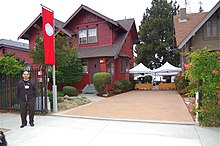
Sōtō Zen or the Sōtō school is the largest of the three traditional sects of Zen in Japanese Buddhism. It is the Japanese line of the Chinese Cáodòng school, which was founded during the Tang dynasty by Dòngshān Liánjiè. It emphasizes Shikantaza, meditation with no objects, anchors, or content. The meditator strives to be aware of the stream of thoughts, allowing them to arise and pass away without interference.

Shunryu Suzuki was a Sōtō Zen monk and teacher who helped popularize Zen Buddhism in the United States, and is renowned for founding the first Zen Buddhist monastery outside Asia. Suzuki founded San Francisco Zen Center which, along with its affiliate temples, comprises one of the most influential Zen organizations in the United States. A book of his teachings, Zen Mind, Beginner's Mind, is one of the most popular books on Zen and Buddhism in the West.

Seungsahn Haengwon, born Duk-In Lee, was a Korean Seon master of the Jogye Order and founder of the international Kwan Um School of Zen. He was the seventy-eighth Patriarch in his lineage. As one of the early Korean Zen masters to settle in the United States, he opened many temples and practice groups across the globe. He was known for his charismatic style and direct presentation of Zen, which was well tailored for the Western audience.

John Daido Loori was a Zen Buddhist rōshi who served as the abbot of Zen Mountain Monastery and was the founder of the Mountains and Rivers Order and CEO of Dharma Communications. Daido Loori received shiho from Taizan Maezumi in 1986 and also received a Dendo Kyoshi certificate formally from the Soto school of Japan in 1994. In 1997, he received dharma transmission in the Harada-Yasutani and Inzan lineages of Rinzai Zen as well. In 1996 he gave dharma transmission to his student Bonnie Myotai Treace, in 1997 to Geoffrey Shugen Arnold, and in 2009 to Konrad Ryushin Marchaj. In addition to his role as a Zen Buddhist priest, Loori was an exhibited photographer and author of more than twenty books and was an avid naturalist.

Hakuyū Taizan Maezumi was a Japanese Zen Buddhist teacher and rōshi, and lineage holder in the Sōtō, Rinzai, and Sanbo Kyodan traditions of Zen. He combined the Rinzai use of kōans and the Sōtō emphasis on shikantaza in his teachings, influenced by his years studying under Hakuun Yasutani in Sanbo Kyodan. He founded or co-founded several institutions and practice centers, including the Zen Center of Los Angeles, White Plum Asanga, Yokoji Zen Mountain Center and the Zen Mountain Monastery.
The Hazy Moon Zen Center is a Soto Zen center in Los Angeles, California.

Japanese Zen refers to the Japanese forms of Zen Buddhism, an originally Chinese Mahāyāna school of Buddhism that strongly emphasizes dhyāna, the meditative training of awareness and equanimity. This practice, according to Zen proponents, gives insight into one's true nature, or the emptiness of inherent existence, which opens the way to a liberated way of living.

Bernie Glassman was an American Zen Buddhist roshi and founder of the Zen Peacemakers, an organization established in 1980. In 1996, he co-founded the Zen Peacemaker Order with his late wife Sandra Jishu Holmes. Glassman was a Dharma successor of the late Taizan Maezumi-roshi, and gave inka and Dharma transmission to several people.

Shōhaku Okumura is a Japanese Sōtō Zen priest and the founder and abbot of the Sanshin Zen Community located in Bloomington, Indiana, where he and his family currently live. From 1997 until 2010, Okumura also served as director of the Sōtō Zen Buddhism International Center in San Francisco, California, which is an administrative office of the Sōtō school of Japan.

Berkeley Zen Center (BZC), temple name Shogakuji, is an Sōtō Zen Buddhist practice centre located in Berkeley, California currently led by Hozan Alan Senauke. An informal affiliate to the San Francisco Zen Center (SFZC), BZC was founded in 1967 by Sojun Mel Weitsman and Shunryu Suzuki as a satellite group for the SFZC. Despite founding the centre, Weitsman was not installed as an abbot there until 1985, one year after receiving Dharma transmission from Hoitsu Suzuki. Weitsman's Dharma heir, Alan Senauke, lives on-site with his wife Laurie Senauke and also works for the Buddhist Peace Fellowship. Another former teacher at BZC was Maylie Scott, who died in 2001. In 1969 Zenkei Blanche Hartman began sitting zazen at BZC, receiving Dharma transmission from Weitsman in 1988. In 1979 the centre relocated to its current location on Russell Street—and today houses a small group of residents who live on site. BZC has an active community and a full schedule of zen service, student talks, dharma talks, and zazen.
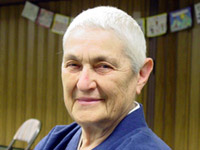
Zenkei Blanche Hartman was a Soto Zen teacher practicing in the lineage of Shunryu Suzuki. From 1996 to 2002 she served two terms as co-abbess of the San Francisco Zen Center. She was the first woman to assume such a leadership position at the center. A member of the American Zen Teachers Association, Blanche was especially known for her expertise in the ancient ritual of sewing a kesa. Hartman became known for her attention to issues women face; she and her late husband Lou Hartman had four children, eight grandchildren, and a number of great-grandchildren.
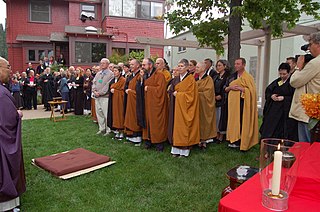
White Plum Asanga, sometimes termed White Plum Sangha, is a Zen school in the Hakuyu Taizan Maezumi lineage, created by Hakuyu Taizan Maezumi. It consists of Maezumi's Dharma heirs and subsequent successors and students. A diverse organization spread across the United States and with a small presence in Europe, the White Plum Asanga
[I]ncludes teachers who represent the spectrum of styles to be found to American Zen—socially engaged Buddhism, family practice, Zen and the arts, secularized Zen, and progressive traditionalism."

Yokoji Zen Mountain Center is a year-round Zen Buddhist training and retreat center located in the San Jacinto Mountains of Southern California. It is a 160 acres of sacred Native American land and wilderness.
An ango (安居), or kessei (結制), is a Japanese term for a three-month period of intense training for students of Zen Buddhism, lasting anywhere from 90 to 100 days. The practice during ango consists of meditation (zazen), study, and work.
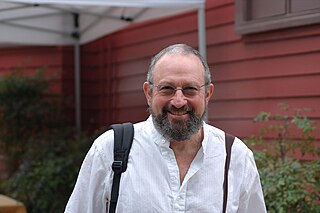
Gerry Shishin Wick is a Soto Zen roshi, author, oceanographer and abbot of Great Mountain Zen Center in Berthoud, Colorado, which he founded in 1996. He is one of the twelve Dharma Successors of the late Taizan Maezumi, receiving Dharma transmission and a Denkai from him in 1990. Prior to it, for 24 years he underwent Zen training with Maezumi, Shunryu Suzuki Roshi and Sochu Suzuki Roshi. He remained the president of White Plum Asanga, a Zen school in the Hakuyu Taizan Maezumi lineage, from 2007 to 2014.
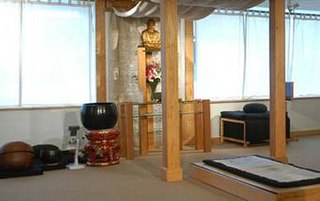
The Atlanta Soto Zen Center (ASZC) is a Soto Zen practice center founded in 1977 by Zenkai Taiun Michael Elliston-sensei, a dharma heir of the late Soyu Matsuoka and guiding teacher of the Mokurai Silent Thunder Order. Rev. Elliston has also received transmission in the Uchiyama lineage through Shohaku Okumura, roshi. The Atlanta Soto Zen Center is recognized by the Soto Zen Buddhist Association and serves as the main training center for the order which has affiliate centers throughout the United States and Canada.

Village Zendo is a combined Soto and Rinzai Zen practice center in lower Manhattan. Originally located in the apartment of Enkyo Pat O'Hara, who founded the zendo in 1986, the Zen center took up the majority of space in O'Hara's apartment. Village Zendo is a practice center of the White Plum Asanga and Zen Peacemaker Circle, the former founded by O'Hara's teacher Taizan Maezumi and the latter by Bernard Glassman.

Taigen Dan Leighton is a Sōtō priest and teacher, academic, and author. He is an authorized lineage holder and Zen teacher in the tradition of Shunryū Suzuki and is the founder and Guiding Teacher of Ancient Dragon Zen Gate in Chicago, Illinois. Leighton is also an authorized teacher in the Japanese Sōtō School (kyōshi).
The Zen Peacemakers is a diverse network of socially engaged Buddhists, currently including the formal structures of the Zen Peacemakers International, the Zen Peacemaker Order and the Zen Peacemaker Circles, many affiliated individuals and groups, and communities formed by Dharma Successors of Roshi Bernie Glassman. It was founded by Bernie Glassman and his second wife Sandra Jishu Holmes in 1996, as a means of continuing the work begun with the Greyston Foundation in 1980 of expanding Zen practice into larger spheres of influence such as social services, business and ecology but with a greater emphasis on peace work. Eve Marko, Bernie Glassman's third wife, is a founding teacher of the Zen Peacemaker Order. Zen Peacemakers have developed from the White Plum Asanga lineage of Taizan Maezumi.
Zen was introduced in the United States at the end of the 19th century by Japanese teachers who went to America to serve groups of Japanese immigrants and become acquainted with the American culture. After World War II, interest from non-Asian Americans grew rapidly. This resulted in the commencement of an indigenous American Zen tradition which also influences the larger western (Zen) world.
